Harvard Ironies
by Rev. Dr. Mark D. Roberts May- June 2004
Note: You may download this resource at no cost, for personal use or for use in a Christian ministry, as long as you are not publishing it for sale. All I ask is that you give credit where credit is due. For all other uses, please contact me at mark@markdroberts.com . Thank you.
| Part 1 | The Statue of the Three Lies |
| Part 2 | The Only Check I'll Ever Write to Harvard |
| Part 3 | Truth . . . for Christ and the Church |
| Part 4 | Thanks and Praise |
| Part 5 | Irony of Ironies |
The Statue of the Three Lies
Part 1 in the series "Harvard Ironies"
Posted at 10:00 p.m. on Saturday, May 29, 2004
| If you were to visit my alma mater, Harvard University, no doubt you’d wander about in Harvard Yard. And, if you were like thousands of other visitors to “The Yard,” you’d end up getting your picture taken in front of the statue of John Harvard.
Or at least you’d think you had your picture taken in front of a statue of John Harvard. After all, the statue has the name “John Harvard” engraved upon it, along with the information that he founded Harvard College in 1638. But, in fact, none of these “facts” are true. That’s why students in the know refer to this monument to Mr. Harvard as “The Statue of the Three Lies.” What are the lies? 1. The carved man is not John Harvard, who left no visual representations of himself, but rather an unnamed person who sat for a sculptor in the 1800’s, two centuries after Mr. Harvard did. 2. John Harvard did not found a college at all. Rather, when he died in 1638, he left a small amount of money in his will to be used for the training of young men for Christian ministry (!). 3. The college (not called Harvard at this time, of course), was founded by the General Court of Massachusetts in 1636. |
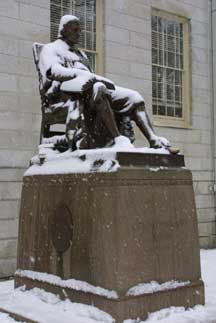 |
So, the statue supposedly of John Harvard, who founded Harvard College in 1638, is actually a statue of an unknown Harvard student, who represents the real John Harvard, who did not found a college in 1638, but who died in 1638, leaving money for a school that had been founded two years earlier. Rev. Harvard, who was known to be a passionate preacher, intended his gift to support the training of Christian ministers. (For more info on John Harvard, see this article.)
Given the current religious state of Harvard University – not exactly a paragon of Christian faith – there’s much irony here. But I want to focus for a moment on the deceptions of this statue. Surely they aren’t the sorts of lies that ruin lives or nations. Yet I find this statue to be a symbol for the reality of our culture. Whether we recognize it or not, we’re swimming in a sea of deceptions. Did you see the news story about the editor . . . .
I don’t want simply to complain about the deceitfulness of our world today. This gets tiresome. I do want to suggest to things that you and I can do to make a difference, albeit a small one. First, we can be steadfast in seeking the truth. Whether that truth is political, religious, historical, relational, or whatever, we need to invest our efforts to go beneath the façade and spin in order to find the truthful bedrock. Second, we can strive in our own lives to be people who speak and live the truth. As you might know, I’ve written a whole book about this, Dare to Be True. I’m convinced that, with God’s help, we can live truth-full lives. This will make a huge difference in our daily lives and closest relationships. And it will make a small dent in the larger world in which we live.
The Only Check I’ll Ever Write to Harvard
Part 2 in the series “Harvard Ironies”
Posted at 10:00 p.m. on Sunday, May 30, 2004
My process for applying to colleges was rather haphazard – so different from what most aspiring high schoolers experience today. I never visited any school to which I applied. I never bothered to correspond with admissions officials. I just sent off my applications, complete with typos and an embarrassingly presumptuous essay in which I claimed to know myself completely. Ugh!
I didn’t plan on applying to Harvard because I figured my chances of getting in were pathetic. I never even sent for an application. But my friend Joe invited me to a Harvard recruitment meeting, so I went along. On the way out of that meeting I grabbed what looked like a fat brochure about Harvard, and went on my merry way.
A few days before the submission deadline Joe asked if I had sent in my Harvard application. “No,” I admitted. “I don’t even have one.”
“Sure you do,” he said. “It’s in that brochure that we picked up.”
Checking when I got home, I discovered that Joe was right. I did have an application after all, so I decided to fill it out. What the heck!
I still remember writing out a check for the application fee. It was $15 or $20. As I wrote the words, “Harvard University,” I thought: “Well, this is the only check I’ll ever write to Harvard in my whole life.”
As it turned out, I was wrong about that. In fact I was a registered student at Harvard during seventeen consecutive years. The last seven I spent on official leave, living in Southern California while completing my Ph.D. dissertation. But Harvard still wanted its annual fees! It’s impossible to calculate how many checks I ended up writing to the University. Maybe a hundred? Maybe more? Looking back on all of this, I see the hand of God, guiding and protecting. At the time everything seemed so random and unpredictable. That’s the way life is while we're in the middle of living it. But, later on, we see how much God was involved in ways we had never imagined. |
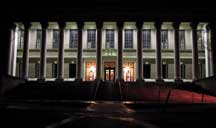 |
|
A night time view of Widener Libarary, the main library at Harvard, where I spent countless hours is college and grad school. |
||
I don’t recommend living quite as recklessly as I did during my senior year of high school. I believe life deserves more intentionality. But I also believe that when we realize God’s presence in our lives – even when we can’t perceive it – we are able to relax a bit more and enjoy what seem to us as unfolding mysteries.
That’s how I want to live today. Trusting God. Believing God. Seeking God. Glorifying God. And enjoying him and his generous gifts.
Truth . . . for Christ and the Church!
Part 3 of the series "Harvard Ironies"
Posted at 10:00 p.m. on Monday, May 31, 2004
When I was in college and grad school, the Harvard seal was omnipresent. On library chairs and notebooks, on sweatshirts and university signs, wherever I turned, there was VE-RI-TAS, following my every move like the eye of God. Harvard was all about veritas, Latin for “truth.” But it wasn’t until I was well into my college experience that I learned the truth about the Harvard seal and the motto emblazoned upon it. Yes, the motto did contain the word veritas. But on the official official university seal veritas didn’t stand alone. It was joined to three other Latin words: christo et ecclesiae. The whole motto translated into English read: “Truth . . . for Christ and the church.” |
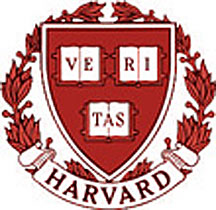 |
This official motto, adopted by the university in 1692, was consistent with Harvard’s original vision for its educational purpose. Among the “Rules and Precepts” of 1646 was the following:
Let every Student be plainly instructed, and earnestly pressed to consider well, the maine end of his life and studies is, to know God and Jesus Christ which is eternal life (John 17:3) and therefore to lay Christ in the bottome, as the only foundation of all sound knowledge and Learning. And seeing the Lord only giveth wisedome, Let every one seriously set himself by prayer in secret to seeke it of him (Prov. 2:3).
Needless to say, somewhere in the last three centuries Harvard lost touch with its primary purpose, though the student body continues to include a healthy number of faithful Christians. The predominant view among most Harvardians these days, however, would be that truth is relative, and that there is no certain truth upon which to base one’s life. The idea that the pursuit of truth is for the sake of Christ and the church would considered an curious antique of a premodern (or pre-postmodern) age. Though I spent eight years in residence at Harvard, I still believe that there is such a thing as VERITAS, as Truth with a capital ‘T.’ Moreover, I even believe that human beings should pursue such Truth for the sake of Christ and the church. This pretty much explains why I do what I do, as a pastor, a professor, and a student of Scripture. In fact, I believe that with the governors of Harvard in 1646, that Christ is “the only foundation of all sound knowledge and Learning.” Yes, I may be a bit of an antique. But sometimes antiques are worth a whole lot more than newfangled contraptions. When it comes to truth, I think the founding leaders of my alma mater got it right. Truth, rightly understood, is indeed “for Christ and the church.” |
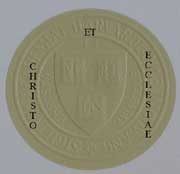 |
|
The official university seal from my Ph.D. diploma. Around the middle shield that reads VERITAS, you can barely see the Latin words CHRISTO ET ECCLESIAE. |
||
Thanks and Praise
Part 4 in the series “Harvard Ironies”
Posted at 10:00 p.m. on Tuesday, June 1, 2004
| The day of my graduation from college began with a baccalaureate service in Harvard’s Memorial Church. There, in a packed room, we sang barely religious hymns and heard inspiring addresses from university officials. God was surely present in this gathering, but his name was rarely mentioned.
The non-religious tone seemed to change, however, when the President of Radcliffe College addressed us. “The Baccalaureate service honors a fine tradition in this university,” she began. “It is a service of thanks and praise.” “Wow!” I thought to myself. “So we’re actually going to acknowledge God in this service.” “So,” the Radcliffe President continued, “in faithfulness to that tradition, I want to thank you for your outstanding efforts during these past four years and praise your for your great accomplishments!” |
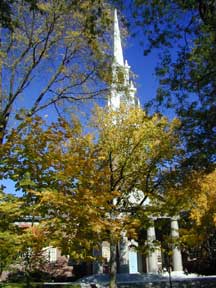 |
|
Memorial Church at Harvard |
||
Okay, so I was wrong. Not exactly what I had in mind when thinking of thanks and praise.
Of course it’s good to thank people for their efforts and to praise them for their accomplishments. Where I live, people are far too stingy with these sorts of affirmation. But if all we do is thank people, we’re missing the greatest and most important part of thankfulness. And if we only praise human accomplishments, we’re failing to praise the greatest achievements of all.
There are many, many reasons why giving thanks and praise to God are so important for us. I’ll mention only one in closing. When I thank God for his gifts to me, when I praise him for his all-surpassing majesty, I put myself in my place. I am rightly humbled before the grace and glory of God. Such humility is good – no, it’s essential – for my soul. Yet, at the same time, when I acknowledge God with thanks and praise I am lifted up. I am drawn closer to God. And I begin to share a bit of his glory. But, knowing whose glory it is, I’m protected from the dangers of pride.
As you live today, be sure to thank and praise the people around you who deserve it. But don’t forget, above all, to thank and praise the God who deserves it all.
Irony of Ironies
Part 5 of the series “Harvard Ironies”
Posted at 10:00 p.m. on Wednesday, June 2, 2004
| One of the most popular movies in 1970 was the tear-jerking classic, Love Story. It starred Ryan O’Neal as Oliver Barrett IV and Ali McGraw as Jennifer Cavilleri, both of whom were students at Harvard. (Technically, Jennifer was a student at Radcliffe College.) This was the movie that popularized the (un)forgettably profound line, “Love means never having to say you’re sorry.” Parts of Love Story were filmed on the Harvard campus. One key building, called Barrett Hall in the movie, was in fact Emerson Hall, the haunts of the Harvard philosophy department. | 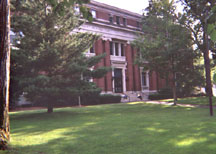 |
As an undergraduate at Harvard I concentrated (majored) in philosophy. Thus I spent countless hours in Emerson Hall, sitting through lectures and arguing in discussion sections. Though philosophy students were required to take a few courses in the history of philosophy, for the most part we studied contemporary philosophy, including logic and philosophy of language. In these classes I learned that truth was merely a human construct, and that God was basically irrelevant to human thought. One of my professors actually acknowledge that the existence of God was 50% probable. I expect the Lord was glad to hear that!
The fact that the great Harvard philosophers inhabited Emerson Hall struck me as extraordinarily ironic, but not because this building had co-starred in Love Story. Rather, the irony of ironies had to do with what was engraved in stone on the outside of Emerson Hall. There, in giant letters, was a portion of Psalm 8: “WHAT IS MAN THAT THOU ART MINDFUL OF HIM.” This line, a portion of Psalm 8:4, calls us to humility before the wonders of the Creator God. It reminds us of our smallness and weakness when compared with the greatness and power of the Lord. Yet, inside the hallowed walls of Emerson Hall, some of the greatest minds of the 20th century reversed the order. |
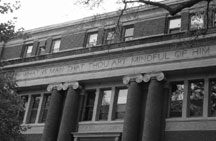 |
|
A black and white close-up of the inscription on Emerson Hall. |
||
Had Emerson Hall been built in the 1970’s (and in the years since), it might well have been inscribed with “WHAT IS GOD THAT THOU ART MINDFUL OF HIM.” Or perhaps “MAN IS ALL WE HAVE TO BE MINDFUL OF.” (Of course the use of “man” as a generic would never be tolerated today!)
It’s almost too easy to laugh at the irony of Emerson Hall with its erudite atheist inhabitants. But before I chuckle too hard, I ought to examine my own life. Though I believe in God, am I living humbly before God today – really? Moreover, am I living as if I had relationship with the all-powerful Creator of the universe? Do my prayers reflect this sort of faith?
Psalm 8 concludes with a double punch line. On the one hand, it reveals that we have been made “a little lower than God” and been given dominion over God’s creation (8:5-8). So, though humbled by God’s greatness, we nevertheless have been honored by him as his royal stewards. On the other hand, the Psalm concludes as it began, with praise of God’s greatness: “O LORD, our Sovereign, how majestic is your name in all the earth!” (8:9). Here is a verse that ought to be engraved upon our minds and hearts!